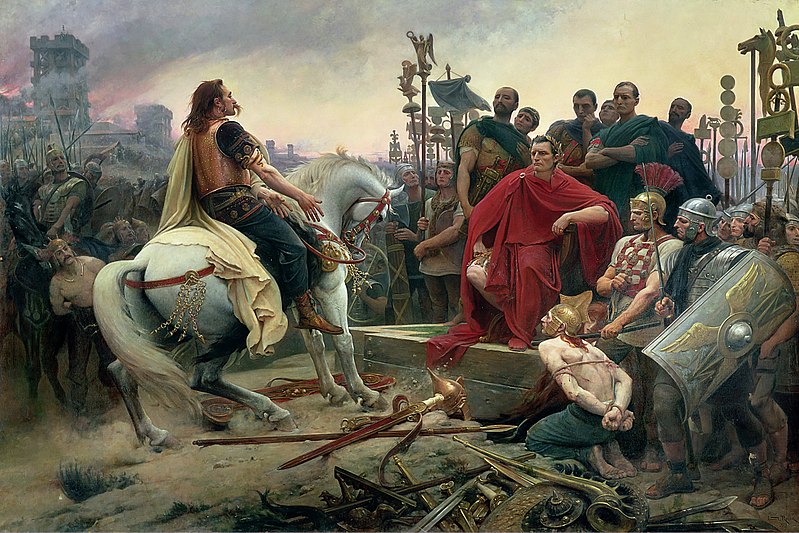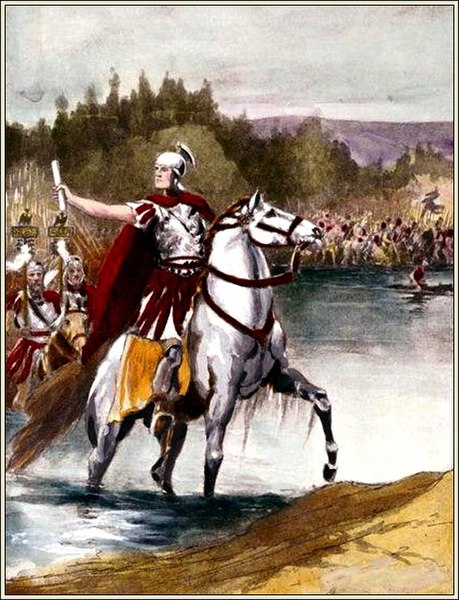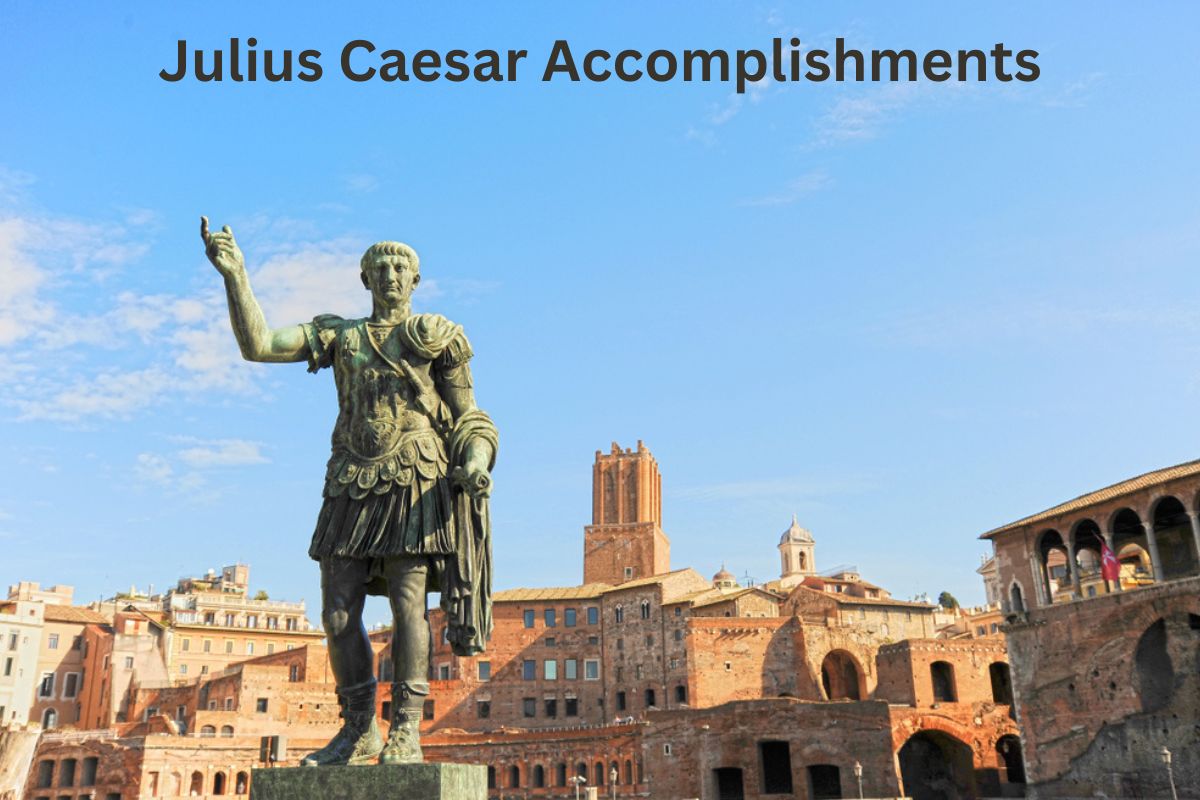Julius Caesar was a renowned Roman general, statesman, and dictator who lived from 100 to 44 BCE. He played a pivotal role in the transformation of the Roman Republic into the Roman Empire.
Known for his military brilliance, political reforms, and larger-than-life persona, Caesar left an indelible mark on ancient Rome. His conquest of Gaul, crossing of the Rubicon, and subsequent rise to power as dictator reshaped the course of Roman history.
Caesar’s accomplishments, including military victories, political reforms, and patronage of the arts, continue to be studied and celebrated to this day.
Accomplishments of Julius Caesar
1. Conquest of Gaul
Julius Caesar’s conquest of Gaul was one of his most significant accomplishments. From 58 to 50 BCE, Caesar led a series of military campaigns that resulted in the successful annexation of Gaul, a region comprising of:
- Modern-day France
- Belgium
- Parts of Switzerland
- Germany
- Netherlands
This conquest greatly expanded the Roman Empire’s territory and brought Gaul under Roman control. Caesar’s campaigns were characterized by strategic brilliance, tactical expertise, and the ability to rally his troops.

His forces faced formidable Gallic tribes, including the Helvetii, Nervii, and Arverni, but Caesar managed to overcome these challenges through a combination of military might, alliances with local tribes, and his exceptional leadership skills.
Also Read: Facts About Julius Caesar
The conquest of Gaul not only secured valuable resources and territories for Rome but also brought wealth and prestige to Caesar himself.
2. Military Reforms
Julius Caesar’s military reforms played a crucial role in his successes on the battlefield. He introduced significant changes to the Roman military, which enhanced its efficiency and effectiveness.
Caesar standardized equipment and training, ensuring that soldiers had consistent and well-maintained weapons and armor. He emphasized discipline and rigorous training, instilling a sense of professionalism and cohesion among his troops.
Also Read: Timeline of Julius Caesar
Caesar also reorganized the army’s structure, improving its command and control systems. These reforms resulted in a highly disciplined and well-trained fighting force that could adapt to different battle conditions and execute complex maneuvers.
The effectiveness of Caesar’s military reforms was evident in his conquest of Gaul, where his well-trained legions were able to overcome numerous Gallic tribes and secure victory.
3. Crossing the Rubicon
One of the most famous events in Julius Caesar’s life was his crossing of the Rubicon River in 49 BCE. The Rubicon marked the boundary between Gaul, where Caesar was stationed, and Italy, which was under the jurisdiction of the Roman Senate.
By crossing the Rubicon with his army, Caesar violated Roman law, which forbade generals from bringing their troops into Italy. This act was a direct challenge to the authority of the Senate and the existing political order.

Crossing the Rubicon sparked the Roman Civil War, pitting Caesar and his supporters against the senatorial faction led by Pompey. It marked a point of no return, as Caesar knew that by defying the Senate, he would either emerge victorious or face severe consequences.
Ultimately, Caesar’s decision to cross the Rubicon set in motion a series of events that would lead to his rise as the sole ruler of Rome.
4. Dictatorship and Political Reforms
After winning the civil war against his political opponents, Julius Caesar assumed the position of dictator of Rome in 49 BCE. As dictator, he implemented various political reforms aimed at strengthening the central government and consolidating his power.
Caesar introduced measures to streamline and centralize the bureaucracy, ensuring more efficient governance. He reduced the influence of the Senate and increased the authority of the executive branch, concentrating power in his own hands.
Caesar also enacted laws to address social and economic issues, such as debt relief for the poor and land distribution to veterans. These reforms aimed to alleviate social unrest, enhance stability, and secure the support of the common people.
5. Calendar Reformation
Julius Caesar introduced the Julian calendar in 45 BCE, revolutionizing the Roman calendar system. The Roman calendar at that time was based on the lunar year and had fallen out of sync with the solar year, causing confusion and inaccuracies in timekeeping.

To address this issue, Caesar implemented the Julian calendar, which was a solar-based calendar with a more precise system for calculating leap years. The Julian calendar had a year of 365.25 days, with an extra day added every four years (leap year).
This reform brought significant improvements in calendar accuracy, aligning it more closely with the astronomical year. The Julian calendar served as the foundation for the subsequent Gregorian calendar used in many parts of the world today.
6. Public Works
Julius Caesar initiated numerous public works projects during his time as dictator. He focused on enhancing the infrastructure and aesthetics of Rome, leaving a lasting impact on the city’s architectural landscape.
Caesar undertook the construction of grand buildings, such as the Basilica Julia and the Curia Julia, which served as centers of administration and governance. He also embarked on the ambitious task of building new forums, expanding the existing ones, and erecting monumental temples and statues.
Additionally, Caesar invested in the improvement of Rome’s infrastructure, constructing new roads, bridges, and aqueducts to facilitate transportation, commerce, and the supply of water to the city.
These public works projects not only beautified Rome but also contributed to its functionality, showcasing Caesar’s vision for a grand and prosperous capital.
7. Economic Reforms
Caesar implemented various economic reforms aimed at improving Rome’s financial stability and supporting its economy. He enacted measures to address issues such as debt relief, which alleviated the burden on the poor and prevented social unrest.
Caesar also implemented price controls to regulate inflation and stabilize the economy. These controls aimed to curb the rising prices of essential goods and prevent economic disparity. Furthermore, Caesar implemented agricultural reforms to boost production and ensure food security.
He encouraged land redistribution, granting plots of land to veterans and increasing the number of small landowners. These reforms aimed to revitalize agriculture, stimulate economic growth, and address socioeconomic inequalities within Roman society.
8. Reconciliation and Citizenship
After the civil war, Julius Caesar displayed a remarkable sense of clemency and sought to reconcile with his former enemies. He pardoned many of his opponents and allowed them to retain their property and positions.
By adopting a policy of leniency, Caesar aimed to heal the divisions within Roman society and foster unity. Additionally, Caesar granted Roman citizenship to numerous inhabitants of the provinces, expanding the rights and privileges of those outside of Rome.
This act of granting citizenship to non-Romans aimed to create a sense of loyalty to Rome and promote integration within the expanding Roman Empire.
9. Expansion of Roman Territory
Julius Caesar continued the Roman tradition of expansion by annexing new territories and incorporating them into the Roman Republic. His conquests included regions in modern-day England (Britannia), Belgium (Gallia Belgica), and Germany (Germania).
These territorial acquisitions not only expanded the borders of the Roman Empire but also secured valuable resources, such as agricultural lands, mineral deposits, and trade routes. Caesar’s military campaigns and successful conquests played a pivotal role in Rome’s territorial expansion and solidified its status as a dominant power in the ancient world.
10. Literary and Cultural Patronage
Julius Caesar was known for his patronage of the arts and culture, supporting renowned poets, writers, and artists of his time. He cultivated relationships with prominent literary figures such as Cicero and Virgil, providing them with financial and political support.
Caesar’s patronage helped foster intellectual and artistic growth during his dictatorship, leading to a flourishing of literature, philosophy, and art. His support and patronage of these cultural luminaries not only enriched Roman society but also left a lasting legacy in the fields of literature and art.
